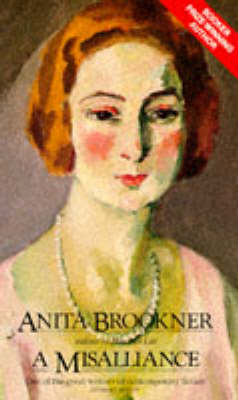New Portway Large Print Books
1 total work
Blanche Vernon is one of those discreet, smart women one sees in restaurants alone. Recently divorced, she considers it a matter of honour to keep herself busy, scrupulously carrying out ordinary tasks as I f they mattered, until darkness falls. She will then open a bottle of good red wine (which she does with increasing regularity) a cook herself a simple nourishing meal. She can still expect the occasional visit from her husband, Bertie, who a year ago defected to a capricious, childishly demanding computer expert called Mousie. Blanche is convinced it is her own misguided sense of stability, gentility and fair play which has led to this state of affairs, and that, if only she could have cultivated a more voluble, petulant nature, things might have turned out differently. Oddly, mutual friends do not see it this way: rather than consideringBlanch 'too sensible', general opinion has it that she has recently become insupportably eccentric - overly fond of literary allusions and piquant non-sequiturs - and moist irritating, she doesn't allow one properly to pity her. Blanch has mentally appropriated the child before she even knows her name - Elinor.
The unnaturally grave three-year-old who sits mute in the local hospital where Blanche does volunteer work has never spoken I her short life. By comparison to this solemn, earth-bound creature, her mother Sally Beamish - all effervescence and weightless vitality - seems like a pagan nymph out of one of the paintings Blanche so often contemplates at the National Gallery. Childless herself, Blanche is wary of becoming too involved with these people emotionally, yet somehow they seem to require her help. Could the child's muteness be some kind of deliberate protest against the freewheeling chaos of life with Sally? Can Blanche provide some assistance without being drawn into the murky affairs which seem to lie at the heart of the family? Just as some women turn in loneliness to drink, to food or to shoplifting, Blanche notes with some irony that she has turned to flirtations with other lives, to good works and to uplifting pastimes. Hers is a memorable portrait of a woman living alone - one with the wit and means to step forward and grasp what has previously eluded her - but who is puzzled by the prospect.
Anita Brookner's beautifully crafted novel is raw and painful yet as graceful and perceptive as anything she has written.
The unnaturally grave three-year-old who sits mute in the local hospital where Blanche does volunteer work has never spoken I her short life. By comparison to this solemn, earth-bound creature, her mother Sally Beamish - all effervescence and weightless vitality - seems like a pagan nymph out of one of the paintings Blanche so often contemplates at the National Gallery. Childless herself, Blanche is wary of becoming too involved with these people emotionally, yet somehow they seem to require her help. Could the child's muteness be some kind of deliberate protest against the freewheeling chaos of life with Sally? Can Blanche provide some assistance without being drawn into the murky affairs which seem to lie at the heart of the family? Just as some women turn in loneliness to drink, to food or to shoplifting, Blanche notes with some irony that she has turned to flirtations with other lives, to good works and to uplifting pastimes. Hers is a memorable portrait of a woman living alone - one with the wit and means to step forward and grasp what has previously eluded her - but who is puzzled by the prospect.
Anita Brookner's beautifully crafted novel is raw and painful yet as graceful and perceptive as anything she has written.
